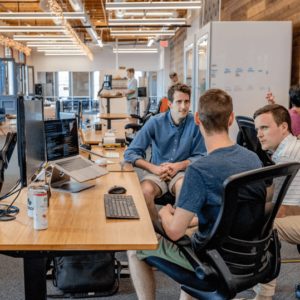General Counsels and in-house lawyers are under more pressure than ever before – with an increase in workload volume, a greater demand to deliver advice, manage risk and ensure legal compliance for the business, there’s very little time left to practise law.
With the Legal sector being considered as Tech sceptics, is it time to start looking at ways to evolve through the digital revolution or risk getting left behind?
On Thursday 23rd June a group of like-minded tech and legal professionals met online to discuss the drivers and barriers to adopting technology within the legal sector.
The morning started with introductions from our partners, Off Road Legal and the conversation started by considering the normalisation of automation.
Adverts are popping up on buses and on TV which is showing acceptance in white-collar industries; everyone is starting to understand that automation can help. “Obviously, factories and blue-collar industries adopted automation a while back, but recently there has been a shift to white-collar automation that is here to stay,” said Peter Impey, Co-Founder of Off Road Legal.
This begs the question of why is automation not accelerating at the same speed within Legal as in other areas of white-collar work?
The Drivers of Change
Ian Gosling, CEO of AUTTO, followed, “Over the last 10 years we have seen a big change within digital transformation in Law. It has been driven by the rise of Legal Operations led by CLOC (Corporate Legal Operations Consortium). CLOC’s Core 12 framework gives us a good basis for looking at all the pieces you need to have in play to move towards having a modern digitally transformed legal function, and how those pieces connect. In my experience, for change to be successful people, process and technology need to align with the business model.”
The main driver for adopting technology is operational excellence. Andrew Wingfield Co-Founder of Off Road Legal went on to explain “The client expects more and that is a major external driver for change. Those demands are being met by new entrants to the legal market, the big four consultancies, technology-enabled competitors, and listed legal businesses all driving change. How will law firms win in this situation, if they don’t innovate with technology?”
“Legal operations is a discipline, if you instil it in a legal team, whether they are private practice, inhouse or a legal operations team, it’s a mindset of understanding the importance of process, legal, data, and using technology to get the best results. The drivers behind adopting technology for law firms and legal functions within a business are completely different and I think that has to be recognised,” said Jeremy Hopkins, Legal Operations Specialist, Contentsquare.
Barriers to Adoption
When it comes to adopting new technologies within any organisation there are always barriers to change. People have tried introducing new tools before, for example, Contract Lifecycle management tools, and failed. This raises the question, do people fail around the tool instead of the tool failing? Have you ever used or been given access to a tool but you either didn’t know how to use it or chose not to use it and continued doing what you normally do? Eventually, the tool takes the blame. To successfully change the people, the process and the technology all need to be aligned to deliver. This can be especially difficult to manage if the change is externally driven and not internally led.
The technology itself must align with the change.
Overcoming the Barriers to Change
The legal industry is traditionally conservative and often a late adopter of innovation. How do law firms and legal professionals adapt to a more competitive and demanding environment?
Trying to get to the result fast using a big bang model of change is risky and a better approach is to implement smaller pieces of the overall digital process. “It’s all about incremental change – small changes that will lead to overall bigger changes and bigger impact for the business,” said Ian Gosling.
One way to implement incremental change is the use of no-code tools which enable incremental change. These allow teams to adopt new ways of working that are low risk, low cost, and still show big results. A no-code environment gives control of the change to the legal team, allowing them to own the transformation of their work. This can help make digital and operational transformation internally-led, helping overcome barriers and concerns about technology and change.
Thank you to everyone who participated in this event and our Partners Off Road Legal. If you would like to find out more about how automation can help your business, request a free demo below and one of our automation experts will get in touch.


